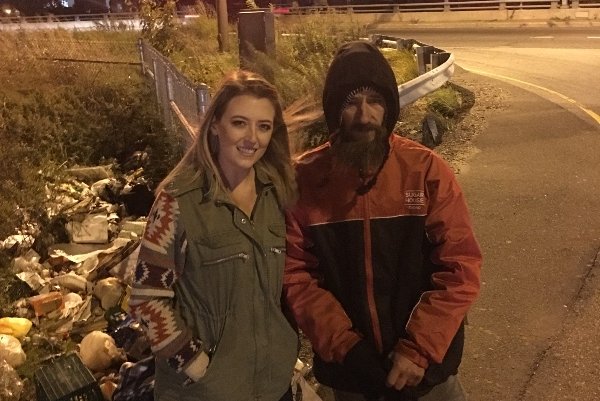
September 05, 2018
 Kate McClure/GoFundMe
Kate McClure/GoFundMe
Kate McClure and Johnny Bobbitt, the homeless man who helped her after she got stranded on I-95 in Philadelphia. McClure started a crowdfunding effort that raised more than $400,000 to help the veteran get back on his feet. But now much of the money is reporting missing.
The story of Johnny Bobbitt Jr. – the homeless man who helped a woman, saw more than $400,000 raised in his name, and then watched that same money disappear – is one that could only happen in the age of the internet, social media, and the digital fundraiser.
Crowdfunding campaigns go viral with staggering regularity, and people are quick to donate — often for the right reasons — to an emotionally gripping cause.
But just how easy is it for someone to take advantage of this phenomenon?
After talking with Mark Roderick, a Cherry Hill-based crowdfunding attorney with Flaster Greenberg, it doesn't seem it's as hard as it should be.
“There are almost no laws around donation-based crowdfunding,” Roderick told PhillyVoice on Wednesday. “The only laws are just old-fashioned rules against fraud. But there’s nothing that protects donors from contributing to a fraudulent campaign.”
Roderick spends most of his time on the equity-based side of crowdfunding, where a participant is making an investment rather than a donation, in large part because of the Wild West-like atmosphere surrounding donation-based crowdfunding.
He says it all relies on laws against fraud.
"I could put up a thing that says, ‘My daughter has leukemia, and we can’t afford the medical care,’ and ask for donations," Roderick said. "The fact is, I don’t even have daughter. That would be fraudulent. It’s probably a crime, it’s theft, and the donors would certainly have the right to get their money back from me, because I’ve defrauded them. It’s not crowdfunding rules, it’s just: You’re not allowed to defraud people."
Roderick has, however, been part of writing the terms and conditions — that fine print we all skim — for websites similar to GoFundMe and Kickstarter. He said the sites distance themselves from legal skirmishes, like the one unfolding in Burlington County court between Bobbitt and the couple that created his GoFundMe campaign, Kate McClure and Mark D'Amico .
“The sites themselves have absolutely no obligation," Roderick said. "I’ve helped create those sites. They assume absolutely no obligation for anything. It’s really a ‘let the buyer beware’ situation for those sites.”
It’s extremely easy to set up a campaign on GoFundMe, the site used to raise over $400,000 for Bobbitt last year.
“The sites themselves have absolutely no obligation. I’ve helped create those sites. It’s really a ‘let the buyer beware’ situation for those sites.” – Attorney Mark Roderick
As a test, a fundraising page was created in under five minutes. The site asked for a name, an email, and a zip code. It didn’t ask to confirm the email address. All of the information could have been entirely false by the time donations started rolling in.
Roderick said he’s received plenty of calls from scorned donors who are concerned they’ve been conned out of money.
“I just say, basically, ‘Good luck! Better be more careful next time.’”
On GoFundMe’s page for its ‘GoFundMe Guarantee’ Refund Policy, the site acknowledges that it “takes a leap of faith to help someone else.” GoFundMe says that “in the rare case that something isn’t right, we will refund your donation.”
In a statement to Forbes on Wednesday, GoFundMe said misuse on its platform is very rare.
"Typically when a campaign is created on behalf of another individual or organization, funds are collected, held, and then only transferred directly to the beneficiary of the campaign," the company said. "This is the standard process when a GoFundMe is created on behalf of another individual or a group of individuals. Normally, the campaign organizer would never touch money, but in this unique situation the campaign organizer was permitted to withdraw the funds. Regardless, we have taken steps to prevent this extremely unique situation from occurring again.”
Follow Adam & PhillyVoice on Twitter: @adamwhermann | @thePhillyVoice
Like us on Facebook: PhillyVoice
Add Adam's RSS feed to your feed reader
Have a news tip? Let us know.